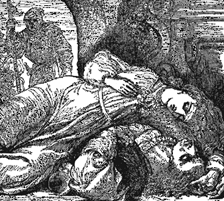Rethinking Love III
 William Shakespeare warns us about the dangers of young “love” in his play Romeo and Juliet. He tells the story of two young people who fall in love in the midst of a war between their families. Romeo is a Montague, while Juliet is a Capulet. They chase each other with a passion, but in the end, their unrelenting infatuation leads to their demise.
William Shakespeare warns us about the dangers of young “love” in his play Romeo and Juliet. He tells the story of two young people who fall in love in the midst of a war between their families. Romeo is a Montague, while Juliet is a Capulet. They chase each other with a passion, but in the end, their unrelenting infatuation leads to their demise. The star-crossed lovers believed that the answers they sought could be found in the other person. When Romeo believed that Juliet had died, he ended his own life. When Juliet awoke from her deathlike sleep, she committed suicide after realizing that Romeo had taken his life. This play is rightly described as a tragedy! How many adolescent suicides, bouts of depression, and insecurities today are related to lost love, and to the perception that the answers to life’s questions and the source of healing have been lost?
The star-crossed lovers believed that the answers they sought could be found in the other person. When Romeo believed that Juliet had died, he ended his own life. When Juliet awoke from her deathlike sleep, she committed suicide after realizing that Romeo had taken his life. This play is rightly described as a tragedy! How many adolescent suicides, bouts of depression, and insecurities today are related to lost love, and to the perception that the answers to life’s questions and the source of healing have been lost?Our culture doesn’t help much. Music videos, video games, television, and the Internet all scream sex. Flip through your television channels. Look at the advertising schemes. What is held up as the ultimate meaning of life? Romantic relationships and physical intimacy! Don’t get me wrong, for those who have had relationships like these, they are wonderful things. They are designed to bring people closer together. But to make these things the object of our quest and our reason for living is to set ourselves up for failure and heartache.
We are in a position to help adolescents navigate through these murky relational waters. There are probably some of you who are thinking that you would never be able to advise a student with issues such as these. You may feel that you don’t have your own act together, so you don’t see how can you possibly help someone else. Don’t worry! Having your life in perfect order is not a prerequisite for helping others.
Labels: Calypso, confusion, depression, insecurities, Juliet, love, Odysseus, passion, relationships, Romeo, sex, Shakespeare, teenage, violence



0 Comments:
Post a Comment
<< Home